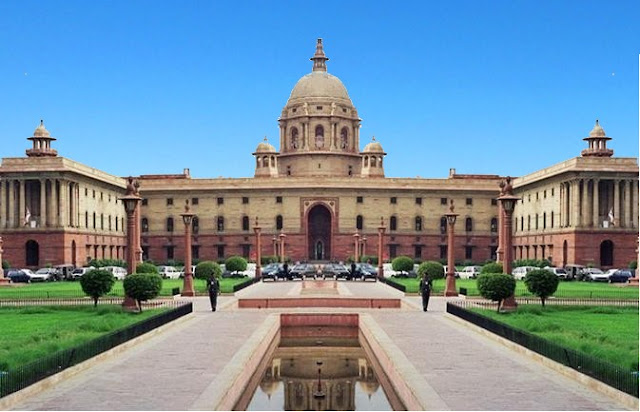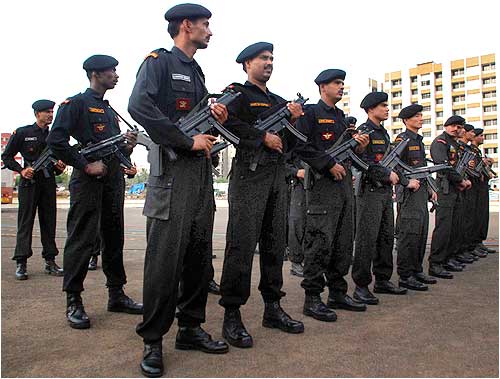India is having a whole long queue of problems to tackle in
national & international arenas. Like many other issues in these critical times,
the proposal for establishing a National Counter-Terrorism Centre (NCTC) to coordinate
the anti-terrorism efforts of the Union and the States has also become a very
important pending issue following
recent dual bomb attacks in Hyderabad on 21st Feb 2013. We must have
to make remarkable progress in improving our counter-terrorism architecture and
our operational and institutional capabilities to deal with such menace, which
are essential in tackling the challenge of terrorism on any level.
NCTC is a proposed federal anti-terror agency to be created in India modeled on the National Counter Terrorism Center of the USA
and Britain's Joint Terrorism Analysis Centre.
The proposal came into picture after the 26/11 Mumbai attacks where several
intelligence and operational failures revealed the need for a federal agency
with real time intelligence inputs of actionable value specifically to counter
terrorist acts against India. It has however met with much criticism from the
Chief Ministers of various states who see this as a means of weakening India's
federalism.
According to the Prime
Minister of India, Dr.Manmohan Singh, the primary purpose behind setting up
the NCTC is to coordinate counter-terrorism efforts throughout this vast
country, as the Intelligence Bureau (IB)
has been doing so far, to reach the shared goal of curbing terrorism and
eradicating militancy.
Constitutional
validity and legality of the NCTC:
The NCTC
will derive its powers from the Unlawful
Activities Prevention Act, 1967. Government initially proposed that it will
be a part of the Intelligence Bureau (IB) and will be headed by a Director who
will report to the Director, IB and the Home Secretary.
The Home Minister of India, Mr. Chidambaram has said that the
NCTC and its powers are derived from the Unlawful Activities (Prevention) Act
that was debated and passed by the Parliament in 2004 and amended in 2008 after
the Mumbai attacks. He has also repeatedly stressed that terrorism has to be
jointly fought by the centre and states.
NCTC is now under consideration and further analysis to Cabinet Committee on Security (CCS) - the apex decision making body of the country on security issues, headed by the Prime Minister.
Structure and functioning of the proposed
NCTC:
The NCTC
will be headed by a Director, who can be a senior IPS officer of the rank of
additional Director General of Police (ADGP) and above and the agency will
report to the Home Ministry. The
Director of the NCTC will report to the Director of the IB and the Union Home Secretary. The NCTC will
have to file detailed notes on its operations and intelligence analysis to both
the agencies. It will have the power to conduct searches and arrests in any
part of India.
It is to be located within the Intelligence Bureau, will carry
out counter-terror operations and collect, collate and disseminate data on
terrorism. The agency will also maintain a data base on terrorist and their
associates including their families. The NCTC will also formulate a response to
terror threats. It is meant to serve as a single and effective point of control
and coordination of all counter terrorism measures. It has also been granted
powers to conduct searches and arrests in any part of India and will formulate
responses to terror threats.
If the Multi Agency Centre (MAC) will be
subsumed into it, the sleuths working in this wing of the IB will form the core
of the NCTC, to begin with. Later on, a number of officers-drawn from
intelligence and security agencies and state police will join the NCTC on deputation.
This body will be the fourth major anti-terror set up after National Investigation Agency (NIA),
National Intelligence Grid (NATGRID) and National Security Guard (NSG) hubs.NCTC
is supposed to take over the counter-terrorism responsibilities which has till
now been vested with the nine intelligence agencies. Under the proposal, may be
agencies like National Investigation
Agency(NIA), the National Technical Research Organization(NTRO), the Joint
Intelligence Committee(JIC), National Crime Record Bureau(NCRB) and National Security Guard(NSG) would be
brought under NCTC. However the relation of NCTC with agencies like Research and Analysis Wing (R&AW),
Aviation Research Centre (ARC) and National
Technical Research Organization (NTRO) has not been specified.
NTRO at
present is the super-feeder agency which provides technical intelligence (top
signals intelligence agency set after the Kargil war of 1999) to other agencies
on internal and external threats. Although NTRO maintains a degree of autonomy,
it is under the control of RAW, a wing of the Cabinet Secretariat.
NATGRID, approved by the union cabinet in
June last year to have a data bank of nearly 20 types of database like travel
record, immigration details, income tax record etc., will work separately. It
will provide all kinds of desired inputs to the NCTC.
The NCTC
will coordinate with all existing intelligence and security agencies and get
terror related inputs from them. After collating these inputs, it will work
with states and other agencies to even neutralize terror modules. Its job will
not end with just sharing intelligence inputs. It will be the NCTC's
responsibility to see whether such inputs are used effectively for its logical
end.
Difference in the National Counterterrorism
Center of the USA and the proposed Indian NCTC:
The
American NCTC deals only with strategic planning and integration of
intelligence without any operational involvement or the Joint Terrorism
Analysis Centre, which too plays a purely coordinating role, the Indian agency
will have not only intelligence functions but also powers to conduct operations,
raids and arrests.
Opposition to the proposed NCTC:
According
to the Constitution of India, law and order is a state subject and thus states are objecting to the NCTC, arguing that such sweeping
powers vested in a Central agency will violate the autonomy of state governments.
The NCTC has been empowered to search and arrest people without keeping the
state government, police or anti-terror squad in the loop.
Several Non-UPA ruled States registered their strong opposition to the NCTC.
There is a
possibility that the establishment of an NCTC would only add to the bureaucratic
tangle in intelligence sharing and counter terrorist action with already running
such agencies like NIA, IB, R&AW
etc.
Central government’s amicable solution for
the related concerns of the states:
The Union
Home Ministry is believed to be making extensive changes on the NCTC proposal
to the Cabinet Committee on Security, including one to make it as a separate organization
outside the IB, which will directly report to the Home Ministry. The
Multi-Agency Centre (MAC) - a platform to share varied intelligence inputs
coming from various agencies like the Directorate
of Revenue Intelligence (DRI), Economic Intelligence Agency, Enforcement
Directorate etc. - will be placed under the NCTC. As of now the MAC is
within the IB.
The Centre
has suggested that the Directors General
of Police (DGP) and the chiefs of
Anti-terror Squads (ATS) of all states be made members of the Standing Council of the NCTC. These
senior police officers are to be informed before the NCTC conducts an operation
in their state. The Union Home Ministry had argued that independent anti-terror
operations would be limited and the apprehended suspect would be immediately
handed over to the local police,
Already established and functioning
security and counter terrorism agencies:

The NIA
Act, 2008 was enacted to address the challenges of terrorism manifested in the
26/11 Mumbai attacks. To complement the NIA, regional hubs of the National
Security Guards have already been established in Mumbai, Chennai, Hyderabad and Kolkata
as the NSGs had to be flown from Delhi
during the 26/11 Mumbai attacks. As and when the NSG guards are required to
intervene, it is given that the NIA and State Police too will intervene and
issues such as arrest, search and seizure will be effectively addressed.
There is
no shortage of agencies dealing with intelligence-gathering and
counter-terrorism measures: Intelligence
Bureau(IB), Research & Analysis Wing(R&AW), Multi-Agency Centre(MAC), State Multi-Agency Centres
and a number of State intelligence agencies. In fact, the problem lies with
too many agencies and the lack of coordination which is caused by turf wars
among different Central and State counter-terrorism agencies, which has to be
handle effectively.

Need of the hour:
India faces formidable terrorism challenges. Though the Union Ministry of Home Affairs in its 2011-2012 Annual Report has stated that “the incidents of terrorist violence have declined from 708 in 2008, 499 in 2009 and 488 in 2010 to 340 in 2011”.There are various agencies which are engaged in intelligence gathering. All the information emanating from these agencies need to be collected and analyzed under a single agency which would lead one to predict with some certainty the threats emanating from terrorists. This however is not happening due to lack of inter-agency cooperation and dissemination of information related to terrorist threats. Under the circumstances the role of National Counter Terrorism Centre (NCTC) proposed by the Home Ministry becomes significant, if implemented properly. Failure in stopping Parliament attack, Mumbai attack,recent Hyderabad attack and several such types of terrorist attacks throughout the country is the need of hour to form a strong agency with taking everything into considerations with amicable solutions of the different concerns of the states.
Terrorism
is today one of the most potent threats to our national security. India needs an
effective counter terrorism structure with efficient mechanisms and response
systems both at the national level and at the State level. Neither the states
nor the Centre can fulfill this task alone. The closest cooperation and
coordination is therefore necessary to meet the threats that emanate from
within and outside our borders. States needs financial assistance and standard training
of State police and intelligence agencies for tackling any type of threat. The
functions of each wing of intelligence should be framed with command and control
structure clearly specified for sharing and coordination of information between
different agencies engaged in intelligence gathering.
What is your opinion regarding such an agency in present conditions ?
What is your opinion regarding such an agency in present conditions ?
How much efficient and equipped are our security establishments across the country on various levels ?What is your view?
How Indian government should tackle terrorism effectively?
Follow @SocioCosmo















0 comments:
Post a Comment
Please note: Comment moderation is enabled and may slightly delay your comment to get finally published. There is no need to resubmit your comment.